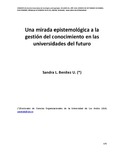Mostrar el registro sencillo del ítem
Una mirada epistemológica a la gestión del conocimiento en las universidades del futuro
| dc.rights.license | http://creativecommons.org/licenses/by-nc-sa/3.0/ve/ | es_VE |
| dc.contributor.author | Benítez U., Sandra L | |
| dc.date.accessioned | 2019-01-14T20:44:05Z | |
| dc.date.available | 2019-01-14T20:44:05Z | |
| dc.date.issued | 2018-01-14 | |
| dc.identifier.issn | 0798-3069 | |
| dc.identifier.uri | http://www.saber.ula.ve/handle/123456789/45574 | |
| dc.description.abstract | El presente artículo aborda un análisis descriptivo de las bases epistemológicas que rigen la gestión del conocimiento en las universidades del futuro, las cuales demandan nuevas formas de actuar y hacer las cosas, tanto en el ámbito organizacional, tecnológico como educativo. Igualmente, el estudio señala una serie de elementos que las universidades del futuro deben considerar al integrarse en la sociedad del conocimiento, la cual a su vez exige respuestas a las necesidades del entorno, tomando en consideración la nueva racionalidad en la dimensión humana, y en los nuevos procesos de transformación de las universidades, que no sólo deben tomar en cuenta el desarrollo económico sino también el desarrollo intelectual, afectivo y moral de los individuos. En el trabajo de investigación se exponen: a) los retos que deben enfrentar las universidades y la educación del futuro, tomando como referencia la visión de pensadores como Edgar Morín, b) reflexiones sobre la complejidad del progreso científico que promueve cambios de paradigmas, nuevas forma de ver el mundo científico, y el surgimiento de nuevas teorías sicológicas adaptadas a nuevas realidades, c) teorías que sustentan la gestión del conocimiento en las organizaciones, y d) reflexiones finales sobre la gestión del conocimiento en las universidades del futuro. El abordaje metodológico responde a una investigación descriptiva, en base a un arqueo heurístico de fuentes. Durante el estudio se infirió que la educación y la gestión de las universidades del futuro, bajo un enfoque epistemológico de la gestión del conocimiento, implica enfrentar eficazmente la complejidad yla multidimensionalidad del entorno, la rapidez de los cambios, y la incertidumbre que caracterizan al mundo moderno ;para ello se requiere evaluar nuevas formar de afronta la organización del capital intelectual de las instituciones, el cual a su vez genera valor a las mismas. | es_VE |
| dc.language.iso | es | es_VE |
| dc.publisher | SaberULA | es_VE |
| dc.rights | info:eu-repo/semantics/openAccess | es_VE |
| dc.subject | Epistemología | es_VE |
| dc.subject | Gestión del conocimiento | es_VE |
| dc.subject | Universidades del futuro | es_VE |
| dc.title | Una mirada epistemológica a la gestión del conocimiento en las universidades del futuro | es_VE |
| dc.title.alternative | An epistemological look at knowledge management in the universities of the future | es_VE |
| dc.type | info:eu-repo/semantics/article | es_VE |
| dc.description.abstract1 | This article deals with a descriptive analysis of the epistemological bases that govern the management of knowledge in the universities of the future, which demand new ways of acting and doing things, both in the organizational, technological and educational fields. Likewise, the study points out a series of elements that the universities of the future must consider when integrating themselves into the knowledge society, which in turn demands answers to the needs of the environment, taking into account the new rationality in the human dimension, and in the new processes of transformation of universities, which must not only take into account economic development but also the intellectual, emotional and moral development of individuals. The research work exposes: a) the challenges that universities and future education must face, taking as a reference the vision of thinkers such as Edgar Morín, b) reflections on the complexity of scientific progress that promotes paradigm changes, new way of seeing the scientific world, and the emergence of new psychological theories adapted to new realities, c) theories that sustain the management of knowledge in organizations, and d) final thoughts on knowledge management in the universities of the future. The methodological approach responds to a descriptive investigation, based on a heuristic arching of sources. During the study it was inferred that the education and management of the universities of the future, under an epistemological approach to knowledge management, involves effectively addressing the complexity and multidimensionality of the environment, the speed of changes, and the uncertainty that characterize the world modern, for it is necessary to evaluate new forms of facing the organization of the intellectual capital of the institutions, which in turn generates value to them. | es_VE |
| dc.description.colacion | 675-695 | es_VE |
| dc.description.email | sandrab@ula.ve | es_VE |
| dc.description.frecuencia | Cuatrimestral | |
| dc.description.paginaweb | www.saber.ula.ve/fermentum | |
| dc.identifier.depositolegal | pp1991102ME302 | |
| dc.publisher.pais | Venezuela | es_VE |
| dc.subject.centroinvestigacion | Centro de Investigaciones en Ciencias Humanas HUMANIC | |
| dc.subject.institucion | Universidad de Los Andes | es_VE |
| dc.subject.keywords | Epistemology | es_VE |
| dc.subject.keywords | Knowledge management | es_VE |
| dc.subject.keywords | Universities of the future | es_VE |
| dc.subject.seccion | Revista Fermentum: Artículo | es_VE |
| dc.subject.thematiccategory | Artes y Humanidades | es_VE |
| dc.subject.tipo | Revistas | es_VE |
| dc.type.media | Texto | es_VE |
Ficheros en el ítem
Este ítem aparece en la(s) siguiente(s) colección(ones)
-
Fermentum - Año 028 - Nº 83
septiembre - diciembre 2018


